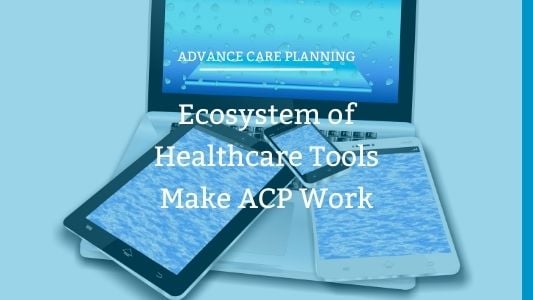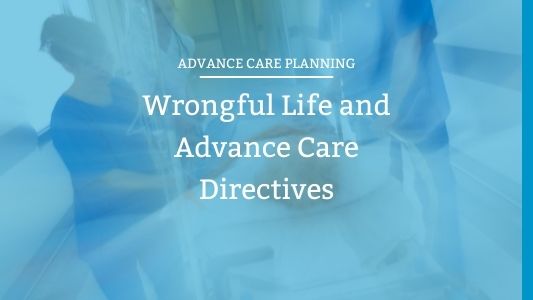5 min read
What Does Advance Care Planning Have To Do With Health Equity?

Democratizing the Patient’s Voice
Everyone should have a voice in their healthcare when it matters most. We believe so, and CMS is making it clear that health equity is a top priority.
Along with health equity, CMS made broader accessibility to advance care planning a key pillar of their efforts for value-based care. Other organizations, such as the National Committee for Quality Assurance (NCQA) have done the same. That’s exactly why the HEDIS Care for Older Adults (COA) quality measures require healthcare providers and payers report on the number of Medicare beneficiaries having ACP discussions.
It’s more than talk. As advance care planning (ACP) has grown, conversations have shifted from “just completing documents” and evolved to deeper understandings of individuals’ health-care goals and values – truly a significant way to achieve health equity. Now medical teams and loved ones have a better grasp of knowing when, or when not, to take heroic measures to preserve one’s life or forego unwanted and unnecessary medical treatments or interventions that would provide little or no benefit.
How does health equity expand access to advance care planning?
Before we discuss the link between advance care planning and health equity, let’s remind ourselves of the premise of health equity. Per the Robert Wood Johnson Foundation . . .
“Health Equity means that everyone has a fair and just opportunity to be as healthy as possible. This requires removing obstacles to health such as poverty, discrimination, and their consequences, including powerlessness and lack of access to good jobs with fair pay, quality education and housing, safe environments, and health care.”
From our advance care planning perspective, when you compare fee-for-service versus value-based care payment models and how they connect to health equity your interactions expand to encompass the whole population, not just those that show up in doctor’s offices and clinics. Here’s how these approaches differ.
Fee-for-Service Advance Care Planning
In this model, when a patient shows up for an office visit, a clinician conducts an advance care planning discussion and is reimbursed by one of two ACP codes. Compensation is based on time spent and action taken. Advance care planning is only offered to those that show up. There is no obligation to reach out to the population that does not schedule annual wellness visits, follow-up appointments, or go to a clinic.

Value-Based Care Advance Care Planning
Here, Medicare payers and providers develop programs to offer ACP to members and patients. Performance is assessed based on percentage of the population that were offered and/or completed advance care planning conversations. Still very transactional and measurement only focuses on two sub-segments:
- Adults 65-80 years of age with advanced illness, frailty, or palliative care
- Adults 81 years of age or older
In value-based care payment models the underlying belief is that having advance care planning discussions results in fewer unwanted and unnecessary procedures and treatments, thereby creating value by honoring what the individual wants while eliminating costs from the system. What patient’s really value is reflective of their life experiences.

Health Equity in Advance Care Planning
All patients and members should be offered an opportunity to create an advance care plan. This means not requiring them to come to you, such as an Annual Wellness visit, but to reach out to them. When everyone you serve given the opportunity to engage in advance care planning, regardless of ethnicity, gender, socioeconomic circumstances, as well as access to transportation, health care, and the Internet, greater health equity can be achieved. We recommend healthcare payers and providers implement initiatives for outreach to everyone in the community, including the 25% of men and 16% of women in the United States that do not have a primary care physician.
Payers and providers must ensure that documenting and storing their ACP documents and protable medical orders is free of charge and accessible anytime, anywhere.
But even more importantly, it’s necessary to ensure urgent care teams can access their advance directives in times of crisis, ensuring patient voice informs medical decision making. Patients and members receive the care they want. Healthcare advocates experience greater peace of mind that what takes place aligns with patient values.

We believe tracking transactions and activities are a start. But to achieve the promise of value-based care and health equity both healthcare providers and payers must evaluate how well they delivered what the patient and member REALLY values.
Democratize Advance Care Planning For Everyone
Advance care planning shouldn’t be reserved for the privileged. Until recently, the fees associated with preparing advance directives were a barrier for millions who lacked the means of engaging an attorney or other qualified professional to document their medical goals, treatment priorities, and care preferences.
A reported 60% of Medicare beneficiaries who were 65 years or older reported having an end-of-life conversation, but only 27% of those did it in a physician's office. Why is that?
Generally, those with higher incomes are more likely to document their wishes as part of estate and financial planning and establish a durable power of attorney for health care.
“Because end-of-life conversations have primarily occurred in conjunction with estate planning, surveys have found socioeconomic disparities in end-of-life planning.”
Not only is this is concerning from a health equity perspective, but also in terms of quality decision making as physicians are better equipped to answer future health care questions than estate planners.
To increase ACP and help address access disparities, CMS introduced CPT codes for advance care planning in 2016. Yet CMS reimbursement claims from 2016 to 2019 remained below 7.5% for all patient subgroups. Roughly half of beneficiaries with advance care planning claims received the service at an annual wellness visit; the remainder received it at a different outpatient visit.
Largely because Black, Hispanic, and Medicaid dual-eligible patients and those with comorbidities have fewer annual wellness visits, it’s not surprising that fewer claims for ACP CPT codes are filed for these individuals. Further, many studies have demonstrated that Black and Hispanic patients have lower rates of outpatient advance care planning and advance directive completion. These differences persist across populations at high risk of dying, including patients with advanced cancer and nursing home residents. Lower rates have been attributed to religious and cultural values, lack of knowledge, problems with the trustworthiness of the health system, and failure by providers to broach the topic with minorities.
We believe digital ACP tools are well positioned to help Medicare Advantage plans and clinicians expand access beyond traditional care settings to improve health equity. Our mobile advance care planning solutions allow healthcare providers to engage patients in the community, at home, and in various institutional and clinical settings where there is more time for discussion than may be available during an office visit. Additionally, the award-winning MyDirectives® application provides Medicare Advantage and VBID plans the opportunity to invite members to engage in advance care planning through their member portal.
Ensure ACP Documents and Portable Medical Orders Are Never Missing In Action
For medical teams to deliver goal-concordant care they need to understand a patient’s goals and values. But what if patients can’t speak for themselves? In the University of Michigan Health and Retirement Study, 70% of participants who were age 60 and older at death and who faced treatment decisions in the final days of their lives were incapable of participating in these decisions.
Even more concerning, research shows less than 5% of patients had ACP documents or portable medical orders available in an emergency. Imagine having the hard conversation and documenting what your patient or member’s values only to have ACP documents and portable medical orders missing when minutes matter and seconds count?
Documenting health and wellness planning is not enough. Advance directive information must also be accessible anytime, anywhere across the continuum of care. Not pined to the refrigerator at home, locked in the safe deposit box, or siloed in an EHR.
Missing advance directive information impacts everyone regardless of socioeconomic status. That’s why we’ve made fully interoperable data exchange with all EHR systems an important component of the ADVault solution suite.
What Advance Care Planning Tools Support Health Equity?
Readily available digital advance care planning tools help democratize advance care planning for your whole population.
More and more healthcare payers and providers like you that are committed to health equity leverage the ADVault solution suite to support their advance care planning initiatives. Here’s six reasons why.

- Achievability. Current users have increased advance care planning completion rates from 35% to over 50% with structured, sustained, educational campaigns and MyDirectives invitations.
- Affordability. Select modular bundles to meet your specific user roles and avoid paying for functionality you don’t need at a small fraction of what competitors charge.
- Flexibility. Create new or upload existing ACP documents and portable medical orders. Patients and members easily access their accounts via the Internet to modify choices as circumstances change.
- Clarity. Summary for Physicians provides a quick snapshot of patient decisions for emergency response. Patient video recorded wishes enhance surrogate and medical team understanding.
- Accessibility. Real connection with every EHR in the healthcare ecosystem that doesn’t require a heavy technology lift and meets industry data exchange interoperability standards.
- Measurability. Automatic tracking of time spent and activities completed to systematically produce compliance reporting, as well as real-time performance dashboard analytics for actionable business insights that support management decision-making.
We invite you to explore all our ACP tools or schedule a demo to see for yourself how ADVault helps healthcare payers and provider fulfil the promise of health equity.
Let’s get started on digital ACP together
Secure, Interoperable, Accessible.
MyDirectives offers the only digital advance care planning (ACP) tools and interoperable cloud-based storage that is HITRUST Risk-Based 2-year Certified.






